In contemporary discourse, the concept of gender equality is often couched in stark terms of opposition and struggle. However, within the rich tapestry of Baha’i teachings lies a profound perspective that places this essential issue within a broader context of human harmony and interconnectedness. Entitled “Death by a Thousand Cuts,” this metaphor aptly encapsulates the insidious and pervasive nature of gender inequality, highlighting how myriad subtle injustices can culminate in profound harm to individuals and society as a whole. To cultivate a harmonious existence, it is imperative to explore how Baha’i teachings illuminate pathways to healing and transformation in the quest for gender equality.
The Baha’i worldview posits that gender equality is not merely a social issue but a fundamental prerequisite for the advancement of civilization. The principles enshrined in Baha’i doctrine assert that both men and women possess equal rights and capacities. This conviction underscores the collective responsibility to dismantle entrenched stereotypes and discriminatory practices that manifest as the ‘thousand cuts’ in the lives of countless individuals. Each instance of inequality, whether overt or nuanced, diminishes the well-being of society and obscures the vision of a unified future. Therefore, a foundational shift in perspective is essential.
At the conceptual heart of Baha’i teachings is the belief in the oneness of humanity. Gender inequality directly undermines this truth by promoting division and discord, eroding the very fabric that binds individuals together. In fostering the realization that both genders are integral to the development of society, a pivotal opportunity presents itself. By cultivating an environment where mutual respect flourishes, society can transcend the limitations imposed by traditional gender roles, thus facilitating an atmosphere ripe for collaboration and understanding.
Moreover, Baha’i teachings advocate the education of all individuals, irrespective of gender. Education serves as a formidable tool for empowerment and liberation. By enlightening individuals about their rights and responsibilities, society can begin to unveil the myriad oppressions camouflaged within cultural norms and practices. When women are educated, not only are they empowered to fulfill their potential, but they also contribute to meaningful societal advancements. This reciprocal dynamic fosters stability and progress, creating ripples of change that can ultimately heal the wounds of inequality.
Healing from the cumulative injuries inflicted by gender inequity necessitates a multifaceted approach. First and foremost, one must actively engage in self-reflection. Understanding one’s own biases and preconceived notions about gender is paramount. Each individual is called upon to interrogate their beliefs, challenging the status quo to foster deeper empathy and understanding. This inward journey paves the way for more profound transformations within communities, as individuals become agents of change.
Community engagement further amplifies the healing process. Establishing dialogues that encompass diverse perspectives allows for a rich exchange of ideas, fostering an environment where all voices are valued. Initiatives that promote inclusive forums—be it in educational settings, workplaces, or local organizations—encourage participation from all genders. This collective effort enhances awareness of the intersections associated with gender inequality, such as race, class, and culture, thus illuminating the various lenses through which to view oppression.
Moreover, the Baha’i principles encourage not only awareness but also proactive measures to support gender equality. Advocating for policies that enable equal opportunities in the workplace, supporting initiatives that address domestic violence, and promoting mentorship programs for young women are all actions that can foster durable change. These societal commitments serve as a counterweight to the ‘thousand cuts’ inflicted upon individuals and families, offering tangible pathways to restore dignity and equity.
The concept of unity is central within Baha’i teachings, wherein the advancement of women is inherently linked to the advancement of society as a whole. When women thrive, families flourish, communities grow resilient, and nations prosper. This vision transcends simplistic dichotomies, urging society to recognize that gender equality is not a zero-sum game but a collective gain. Advocating for this collective benefit engenders a transformative shift, pushing back against adversarial frameworks that often dominate discussions of gender issues.
In advancing dialogue around gender equality, it is also vital to incorporate men into the conversation. Men’s roles in advocating for and supporting women’s rights are indispensable. This partnership fosters a deeper understanding of shared responsibilities and cultivates a collaborative spirit. The goal is not merely to elevate women but to redefine masculinity in ways that do not perpetuate harmful power dynamics. By dismantling the myths surrounding masculinity, society can forge alliances that champion equality and shared growth.
Ultimately, as the Baha’i teachings assert, the road towards gender equality is a journey—one marked by ongoing commitment, a willingness to engage in difficult conversations, and a collective embrace of change. It requires not only a recognition of the damage done but also a concerted effort to heal and rebuild. The wounds of inequality may fester for years, yet the process of healing offers hope, renewal, and transformation.
Through the lens of Baha’i teachings, the metaphor of “Death by a Thousand Cuts” serves as both a warning and a call to action. Society stands at a crossroads, where the resolve to confront these insidious inequalities can pave the way for a more just and harmonious world. By embracing the shared goal of gender equality—and recognizing its profound implications for humanity as a whole—there exists an unparalleled opportunity to foster healing, understanding, and ultimately, a brighter future for all.
